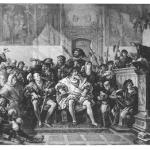Day after day, Pope Francis reaches out to first one, then another group: religious sisters, the elderly and infirm, prisoners, priests and bishops, young children—and this month, to the visually impaired.
On June 11, Pope Francis recorded a personal greeting to a group of about 75 participants, most of them elderly, in the annual summer program offered by the Italian Association for the Blind and Visually Impaired (Unione Italiana Ciechi elpovedenci). The program took place at Le Torri Centre in Tirrencia, Italy.
“I know that some of you wanted to come to Rome,” said the Holy Father. He continued:
Thanks to modern technology, I can come to you! Thank you for your appreciation, for your affection, and especially for your prayers.
The Gospels tell us that Jesus had a particular care for the blind. Besides other sick persons, He healed many blind persons. But the healing of a visually impaired person has special symbolic meaning: it represents the gift of faith. It is a sign that concerns us all because we all need the light of faith to walk along the path of life. This is why Baptism, which is the first Sacrament of Faith, was also called ‘illumination’ in antiquity.
I ask the Lord to renew the gift of faith in each of you, so that your spirits may always have God’s light, the light of love that makes sense of our lives, illuminates it, gives us hope, and makes us good and available to our brothers and sisters.
I also wish the best for your association…. Always spread a culture of encounter, solidarity, and hospitality towards persons with disabilities, not just asking for the proper social services but also encouraging their active participation in society.
I entrust you all to the protection of the Blessed Virgin Mary, our Mother. I ask you to pray for me and for my service to the Church and I wholeheartedly bless you, together with your loved ones.”
A week later, on June 18, a Vatican official called for an end to what he called “book famine” for the blind, noting that only 1% of the books in developing and least developed countries—and just 5% of books in developed countries—are available in Braille formats accessible to blind people.
Catholic News Service reported that Archbishop Silvano M. Tomasi, the Vatican’s Permanent Observer to the United Nations agency in Geneva, called for an adjustment to existing copyright laws to permit wider distribution of Braille books. With an estimated 285 million people worldwide who are visually impaired, copyright laws serve as barriers for making books available in Braille.
According to Catholic News Service,
The goal of the copyright system is “the dissemination of creative works to enhance the common good,” the archbishop said. “Copyright has never been an end in itself.”
Translating books into Braille and printing them is a lengthy and expensive process, which is particularly prohibitive for the 90 percent of visually impaired people who live in the developing world…. In an increasingly digital world, the archbishop argued, technology—like audio books and text-to-speech tools—could make an enormous difference if unfettered by laws he described as “out-of-date” and “often quite restrictive.”
“It is fundamental to create an international instrument that could give even to impaired people a variety of opportunities to discover their potential, understand their environment, discover their rights and put to the best use their talents and resources both for personal fulfillment and for their contribution to society.
Archbishop Tomasi went on to cite Article 27 of the Universal Declaration of Human Rights, which states that individuals have the right to take part in their community’s cultural life and benefit from both the arts and sciences. He quoted Blessed John Paul II’s encyclical Laborem Exercens, which said that discrimination against impaired persons is “radically unworthy of man, and a denial of our common humanity.”
A Worthwhile Endeavor in the United States
 How many Catholic books, I wondered, are available in Braille for sight-impaired readers?
How many Catholic books, I wondered, are available in Braille for sight-impaired readers?
Here in the United States, the Xavier Society for the Blind has, since 1900, sought to make writings on religion and spirituality available to the blind. From its humble beginnings in a single room at the College of St. Francis Xavier (later the High School), the Xavier Society was the only Catholic publishing house to make such writings available to the blind. All services were provided free of charge, a tradition that continues to the present.
The Xavier Society was inspired in 1900 by a group of dedicated lay women aided by a Jesuit priest, Rev. Joseph Stadelman, S.J. The Xavier Society was legally incorporated in 1904. Its first major undertaking was a transcription of the Bible into Moontype, then New York Point, and finally Braille in 1918.
Since its founding, the Xavier Society has continued its pioneering mission by adding large print, records, audiocassette and most recently digital formats to its Braille offerings. In 1995, the Xavier Society was the first to transcribe the entire Catechism of the Catholic Church, including footnotes and indices, into all three formats. As new translations of Scripture and readings and prayers for the Mass have been approved by the U.S. Conference of Catholic Bishops, the Xavier Society was ready to transcribe and offer them to their clients.
Father John Sheehan, SJ, Chairman of the Board and acting CEO, continues the tradition of this Jesuit-led ministry today, working with six full-time staff members and almost 100 volunteers to assure that “those without sight may see.”
For more information about the Xavier Society for the Blind, or to assist in their work, visit their website.
















